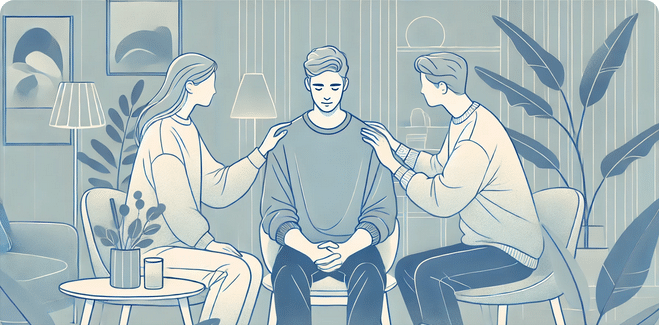Key Takeaways
- ADHD is a complex neurodevelopmental disorder that can be managed through comprehensive lifestyle and therapeutic strategies.
- Nutrition, physical activity, and dietary modifications can significantly impact ADHD symptom management.
- Behavioral therapy and mindfulness practices offer powerful tools for developing coping mechanisms and improving cognitive functioning.
- Support networks and embracing neurodiversity are essential for individuals living with ADHD.
- A Mission for Michael (AMFM) provides comprehensive, personalized ADHD treatment across multiple locations, offering holistic support for individuals seeking alternative management strategies.
Understanding ADHD
The Complex Nature of ADHD
Attention Deficit Hyperactivity Disorder (ADHD) is a nuanced neurodevelopmental condition that affects millions worldwide. Far more than a simple focus problem, ADHD represents a fundamental difference in brain functioning that impacts every aspect of an individual’s life. While medication can be helpful, many individuals seek alternative approaches to managing their symptoms effectively.
Medical Perspectives on Holistic Strategies
Medical professionals increasingly recognize that ADHD management is not a one-size-fits-all approach. Experts emphasize that lifestyle modifications and holistic strategies can significantly impact symptom management. The key is understanding that while medication can be beneficial, it is not the sole path to improving daily functioning.
| A Mission For Michael: Expert Mental Health Care Founded in 2010, A Mission For Michael (AMFM) offers specialized mental health care across Southern California, Minnesota, and Virginia. Our accredited facilities provide residential and outpatient programs, utilizing evidence-based therapies such as CBT, DBT, and EMDR. Our dedicated team of licensed professionals ensures every client receives the best care possible, supported by accreditations from The Joint Commission and the California Department of Health Care Services. We are committed to safety and personalized treatment plans. Start your recovery journey with AMFM today! |
Foundational Lifestyle Approaches
Nutritional Science and Brain Function
Nutrition stands as a critical cornerstone in managing ADHD symptoms. Dietary choices profoundly impact brain chemistry and cognitive functioning. Experts recommend a comprehensive nutritional approach and simple food restriction. The goal is to provide the brain with optimal nutrients that support neurotransmitter balance and cognitive performance.
Omega-3: The Brain’s Essential Nutrient
Omega-3 fatty acids play a critical role in brain development and neurological function. Studies have shown that children and adults with ADHD often have lower levels of omega-3, and supplementation can potentially improve attention, reduce hyperactivity, and support overall cognitive performance.
Eliminating Dietary Triggers
Certain food components can exacerbate ADHD symptoms. Refined sugars, artificial additives, and processed foods can create neurochemical imbalances that intensify attention and impulse control challenges. A carefully curated diet that minimizes these triggers while maximizing nutrient-dense whole foods can significantly impact symptom management.
Physical Activity as Neurological Intervention
Exercise transcends simple physical health, functioning as a powerful neurological intervention for ADHD. Physical activity triggers the release of dopamine, norepinephrine, and other neurotransmitters critical for attention and focus. Regular exercise helps regulate brain chemistry, improve executive functioning, and provide a constructive outlet for excess energy.
Therapeutic Strategies
Behavioral Therapy: Rewiring Cognitive Patterns
Behavioral therapy represents a sophisticated approach to ADHD management. Unlike simple symptom suppression, this therapeutic method focuses on developing adaptive cognitive and behavioral strategies. Trained professionals work to help individuals understand their unique neurological functioning, develop coping mechanisms, and build skills that compensate for ADHD-related challenges.
Cognitive Behavioral Techniques
Specific cognitive behavioral techniques can help individuals with ADHD reframe their thinking and develop more effective problem-solving approaches. These techniques might include breaking complex tasks into manageable steps, developing personalized organizational systems, and creating strategies for managing impulsivity and maintaining focus.
Mindfulness as a Neurological Training Ground
Mindfulness practices offer a powerful tool for ADHD management. These techniques essentially function as neurological training, helping individuals develop greater awareness of their thought patterns and improve attentional control. Regular mindfulness practice can physically reshape neural pathways, improving focus, emotional regulation, and stress management.
Supplemental Support
Natural Supplements and Their Potential
Certain supplements may offer additional support for individuals with ADHD. Omega-3 fatty acids have demonstrated potential in improving attention and brain health. Melatonin can help with sleep regulation, while herbal supplements like Bacopa monnieri may support cognitive function. However, consult healthcare professionals before starting any supplement regimen.
Environmental and Lifestyle Modifications
Creating supportive environments can significantly impact ADHD management. This includes establishing consistent routines, minimizing distractions, optimizing sleep hygiene, and developing structured approaches to work and study. Small modifications can make substantial differences in daily functioning.
Support and Emotional Well-being

ADHD support from loved ones helps manage challenges.
Building a Supportive Network
Family, friends, support groups, and professional counselors can provide emotional support, practical strategies, and a sense of understanding. Connecting with others who understand the ADHD experience can be incredibly empowering.
Embracing Neurodiversity
Understanding ADHD as a difference rather than a deficit is transformative. Many individuals with ADHD possess unique strengths, including creativity, innovative thinking, and intense focus on areas of passion. Embracing these strengths can shift the narrative from limitation to potential.
ADHD Challenges
Individualized Approach
There is no universal solution for ADHD management—what works for one person may not work for another. Continuous assessment, flexibility, and willingness to adapt strategies are essential. Professional guidance can help individuals develop personalized approaches that evolve with their changing needs.
When to Consider Medication
While this approach focuses on non-medication strategies, medication remains a valuable tool for many. Some individuals may find that a combination of lifestyle strategies and medication provides the most effective management.
Is Living Without Medication Possible?
Yes, living with ADHD without medication is possible for many individuals. However, this approach requires a comprehensive, personalized, and committed strategy. Success depends on multiple factors, including the severity of symptoms, individual response to alternative interventions, and willingness to implement holistic management techniques.
The journey is not about eliminating ADHD but about understanding oneself, developing personalized strategies, and recognizing the unique perspectives and strengths that come with neurodiversity. While not every individual will find complete symptom management without medication, many can significantly improve their quality of life through dedicated, multifaceted approaches.
Always consult with healthcare professionals to determine the most appropriate management strategy for your specific situation.
Why Choose A Mission for Michael for Your ADHD Treatment?

A structured and professional treatment setting provides the stability and support needed to effectively manage ADHD symptoms.
At A Mission for Michael (AMFM), we understand the complex challenges of Attention Deficit Hyperactivity Disorder. Our dedicated mental health professionals specialize in providing comprehensive care for individuals facing the intricate challenges of ADHD. With treatment facilities across California, Minnesota, and Virginia, we offer accessible, specialized support for those seeking effective ADHD management.
Multidisciplinary Approach to Treatment

A personalized ADHD plan works best with expert guidance.
We employ a multidisciplinary team of qualified therapists, clinicians, psychologists, psychiatrists, and educators who collaborate to create personalized treatment plans. Recognizing that ADHD is a nuanced neurodevelopmental disorder, we develop strategies that address the needs of each individual, focusing on improving attention, organizational skills, and managing distractibility.
Accessible and Confidential Services
We are committed to making ADHD support accessible to everyone. Our free and confidential ADHD assessments are conducted by experienced professionals who understand the complexities of the disorder. We work with most major insurance providers and are dedicated to helping individuals find the right care, even if that means connecting them with alternative resources.
At A Mission for Michael, we don’t just treat ADHD—we support individuals in thriving with ADHD.
Frequently Asked Questions
Is it really possible to manage ADHD without medication?
Yes, many individuals can effectively manage ADHD symptoms through comprehensive lifestyle approaches, including nutrition, exercise, behavioral therapy, and supportive strategies.
What are the most effective non-medication approaches for ADHD?
The most effective approaches include behavioral therapy, mindfulness practices, dietary modifications, regular exercise, creating structured environments, and developing strong support networks.
How does diet impact ADHD symptoms?
Nutrition plays a key role in managing ADHD symptoms. Reducing processed foods, minimizing sugar intake, incorporating omega-3 fatty acids, and maintaining a balanced diet will help regulate brain chemistry and improve cognitive functioning.
Can mindfulness really help with ADHD?
Mindfulness practices can be powerful tools for individuals with ADHD, helping to improve attention control, emotional regulation, and providing neurological training that can reshape neural pathways.
Why should I choose A Mission for Michael for ADHD support?
A Mission for Michael (AMFM) offers comprehensive, personalized ADHD treatment with a holistic approach, providing expert guidance across multiple locations, specialized multidisciplinary support, and a commitment to empowering individuals with ADHD to thrive.











